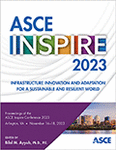The Concept of Diagonal Approximated Signature: New Surrogate Modeling Approach for Continuous-State Systems
Publication: ASCE Inspire 2023
ABSTRACT
The increasing size and complexity of modern systems present engineers with the inevitable challenge of developing more efficient, yet comprehensive computational tools that enable sound analyses and ensure stable system operation. This work proposes the continuous-state survival function (CSSF), and the concept of the diagonal approximated signature (DAS) is introduced as a corresponding surrogate model. The proposed concept is based on combinatorial decomposition adapted from the concept of survival signature. This allows for the advantageous property of separating topological and probabilistic information. Potentially high-dimensional coherent structure functions are the foundation. The proposed approach enables direct computation of the CSSF by means of an explicit formula and a stored DAS, avoiding costly online Monte Carlo simulation (MCS) and overcoming the limitation of binary component and system state consideration during resilience optimization for sub-structured systems. A proof of concept is provided for multidimensional systems and an arbitrary infrastructure system.
Get full access to this article
View all available purchase options and get full access to this chapter.
REFERENCES
Coolen, F. P. A., and T. Coolen-Maturi. 2013. “Generalizing the Signature to Systems with Multiple Types of Components.” In Complex Systems and Dependability, 115–30. Springer.
Eryilmaz, S., and A. Tuncel. 2016. “Generalizing the Survival Signature to Unrepairable Homogeneous Multi-State Systems.” Naval Research Logistics (NRL) 63 (8): 593–99.
Gámiz, M. L., and M. D. M. Miranda. 2010. “Regression Analysis of the Structure Function for Reliability Evaluation of Continuous-State System.” Reliability Engineering & System Safety 95 (2): 134–42.
Hudson, J. C., and K. C. Kapur. 1983. “Reliability Analysis for Multistate Systems with Multistate Components.” AIIE Transactions 15 (2): 127–35.
Hudson, J. C., and K. C. Kapur. 1985. “Reliability Bounds for Multistate Systems with Multistate Components.” Operations Research 33 (1): 153–60.
Jain, N., O. P. Yadav, A. P. S. Rathore, and R. Jain. 2017. “Reliability Assessment Framework for a Multi-State Multi-Component System.” Journal of Industrial and Production Engineering 34 (8): 580–89.
Liu, Y., Y. Shi, X. Bai, and B. Liu. 2018. “Stress–Strength Reliability Analysis of Multi-State System Based on Generalized Survival Signature.” Journal of Computational and Applied Mathematics 342: 274–91.
Patelli, E., G. Feng, F. P. A. Coolen, and T. Coolen-Maturi. 2017. “Simulation Methods for System Reliability Using the Survival Signature.” Reliability Engineering & System Safety 167: 327–37.
Qin, J., and F. P. A. Coolen. 2022. “Survival Signature for Reliability Evaluation of a Multi-State System with Multi-State Components.” Reliability Engineering & System Safety 218: 108129.
Salomon, J., J. Behrensdorf, N. Winnewisser, M. Broggi, and M. Beer. 2022. “Multidimensional Resilience Decision-Making for Complex and Substructured Systems.” Resilient Cities and Structures 1 (3): 61–78.
Salomon, J., M. Broggi, S. Kruse, S. Weber, and M. Beer. 2020. “Resilience Decision-Making for Complex Systems.” ASCE-ASME J Risk and Uncert in Engrg Sys Part B Mech Engrg 6 (2).
Winnewisser, N. R., J. Salomon, M. Broggi, and M. Beer. 2023. “The Concept of Diagonal Approximated Signature: New Surrogate Modeling Approach for Continuous-State Systems in the Context of Resilience Optimization.” Disaster Prevention and Resilience 2 (2): 4.
Yi, H., L. Cui, and N. Balakrishnan. 2021. “Computation of Survival Signatures for Multi-State Consecutive-k Systems.” Reliability Engineering & System Safety 208: 107429.
Information & Authors
Information
Published In
History
Published online: Nov 14, 2023
ASCE Technical Topics:
- Biological processes
- Business management
- Computer models
- Computer networks
- Computing in civil engineering
- Decision making
- Decision support systems
- Decomposition
- Engineering fundamentals
- Environmental engineering
- Foundations
- Geotechnical engineering
- Infrastructure
- Internet
- Mathematics
- Methodology (by type)
- Models (by type)
- Monte Carlo method
- Numerical methods
- Practice and Profession
- Probability
- Waste management
Authors
Metrics & Citations
Metrics
Citations
Download citation
If you have the appropriate software installed, you can download article citation data to the citation manager of your choice. Simply select your manager software from the list below and click Download.
